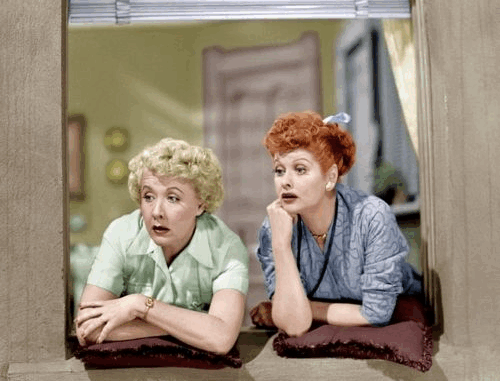
Few shows in television history have had the kind of influence that I Love Lucy did when it first premiered in 1951. What began as a sitcom about a quirky housewife and her Cuban bandleader husband quickly grew into a cultural phenomenon that redefined the possibilities of TV comedy. More than seventy years later, I Love Lucy continues to captivate audiences, proving that its humor, innovation, and groundbreaking choices remain timeless.
A Sitcom That Changed Everything
At its core, I Love Lucy followed Lucy Ricardo (Lucille Ball), a spirited and often mischievous housewife in New York City, who was constantly getting into trouble while trying to break into show business. Her husband, Ricky Ricardo (Desi Arnaz), served as the straight man to her chaos — a nightclub bandleader often exasperated by Lucy’s antics. Alongside their neighbors and best friends, Ethel and Fred Mertz (Vivian Vance and William Frawley), the Ricardos became the centerpiece of one of the most beloved ensembles in television history.
What made I Love Lucy different wasn’t just the slapstick. The writing was sharp, the physical comedy brilliant, and the chemistry between the cast undeniable. But even beyond the laughs, the show marked a turning point in how television was made and consumed.
Breaking Barriers in a Conservative Era
In the 1950s, television often portrayed idealized versions of American life. I Love Lucy shattered those conventions. By casting Desi Arnaz — a Cuban-American actor and musician — as Lucy’s husband, the show became one of the first to portray an interracial marriage on screen. Network executives were hesitant, but Lucille Ball fought to have her real-life husband play her partner. Her determination not only changed her career but also helped normalize diversity on television at a time when it was far from common.
The show also wasn’t afraid to address real-life situations. When Ball became pregnant in 1952, the producers made the then-daring decision to write the pregnancy into the show. Although CBS refused to use the word “pregnant” on air, Lucy’s storyline mirrored Ball’s actual life, and the birth episode of Little Ricky became one of the most-watched broadcasts in television history.
Pioneering Production Techniques
One of the most significant ways I Love Lucy redefined comedy was through its innovative production. Desi Arnaz, who handled much of the behind-the-scenes business, insisted on shooting the show in front of a live studio audience using a three-camera setup. This technique captured multiple angles simultaneously and preserved the natural rhythm of the performances.
Equally groundbreaking was the decision to film the series on 35mm film. This not only ensured high-quality broadcasts but also created the foundation for TV reruns. At the time, reruns were unheard of, but I Love Lucy’s enduring appeal made them a staple of television, allowing audiences to revisit episodes long after their original airdate.
Iconic Episodes That Still Make Audiences Laugh
The brilliance of I Love Lucy lies in its timeless comedy. From Lucy and Ethel frantically wrapping chocolates on an assembly line, to Lucy’s hilarious attempt to stomp grapes in Italy, to her disastrous performance with Ricky’s band, these moments remain etched in television history.
What makes these episodes so memorable is Lucille Ball’s commitment to physical comedy. She threw herself — often literally — into every gag, balancing exaggerated movements with perfect timing. Ball’s fearless performances elevated slapstick to an art form, inspiring countless comedians who followed.
A Legacy of Influence
Beyond its laughs, I Love Lucy built a legacy that still shapes the television industry today. Syndication, reruns, and the multi-camera format owe their popularity to the innovations of Desilu Productions, the company Ball and Arnaz founded to produce the show.
Ball herself became a trailblazer in entertainment. After her divorce from Arnaz, she took control of Desilu and became the first woman to head a major television studio. Under her leadership, Desilu produced groundbreaking series such as Star Trek and Mission: Impossible, expanding her influence well beyond comedy.
Why It Still Resonates Today
Even in the 21st century, I Love Lucy continues to air around the world, charming audiences who weren’t even born when the show premiered. Its humor feels universal — rooted in everyday struggles like ambition, marriage, friendship, and mischief.
But perhaps the real reason it endures is that it offers both escapism and authenticity. Lucy Ricardo’s dreams, frustrations, and resilience remain relatable, and Lucille Ball’s genius ensures the comedy never feels dated. The laughter she inspired transcends generations.
Final Thoughts
I Love Lucy wasn’t just another sitcom — it was a revolution. It redefined what television comedy could be, broke barriers in representation, and introduced production practices that still dominate the industry. At the heart of it all was Lucille Ball, whose unmatched comedic talent and trailblazing vision cemented her as a legend.
More than seventy years later, when viewers hear Lucy Ricardo’s infectious laughter or see her latest scheme go hilariously wrong, they’re reminded why I Love Lucy isn’t just part of TV history — it is TV history.
